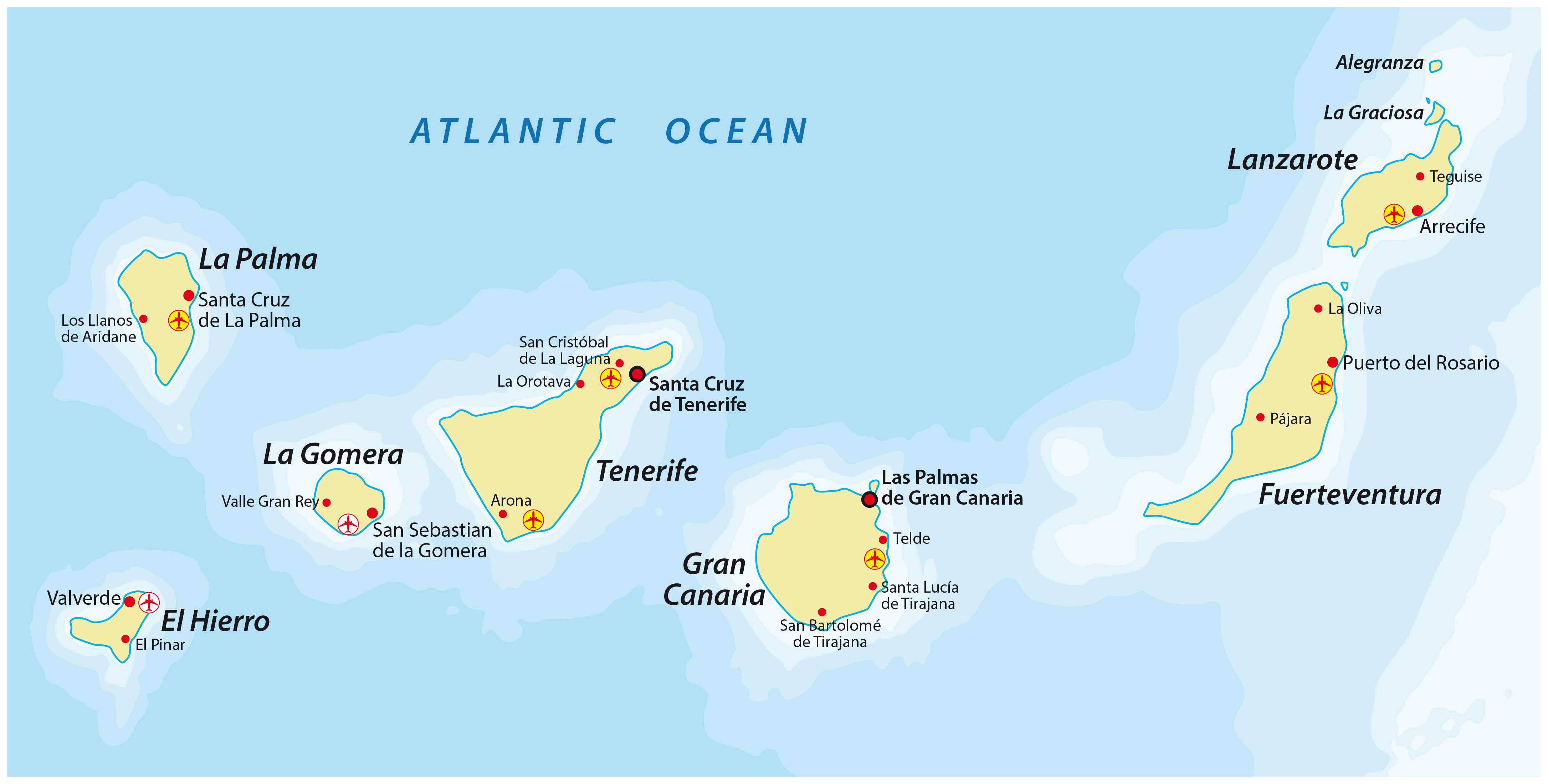Retire in the Canary Islands for Beaches and Natural Beauty
Retire in the Canary Islands for an affordable life that can be as hectic or as chill as you like. The one constant will be almost year-round mild weather.


Profit and prosper with the best of Kiplinger's advice on investing, taxes, retirement, personal finance and much more. Delivered daily. Enter your email in the box and click Sign Me Up.
You are now subscribed
Your newsletter sign-up was successful
Want to add more newsletters?

Delivered daily
Kiplinger Today
Profit and prosper with the best of Kiplinger's advice on investing, taxes, retirement, personal finance and much more delivered daily. Smart money moves start here.

Sent five days a week
Kiplinger A Step Ahead
Get practical help to make better financial decisions in your everyday life, from spending to savings on top deals.

Delivered daily
Kiplinger Closing Bell
Get today's biggest financial and investing headlines delivered to your inbox every day the U.S. stock market is open.

Sent twice a week
Kiplinger Adviser Intel
Financial pros across the country share best practices and fresh tactics to preserve and grow your wealth.

Delivered weekly
Kiplinger Tax Tips
Trim your federal and state tax bills with practical tax-planning and tax-cutting strategies.

Sent twice a week
Kiplinger Retirement Tips
Your twice-a-week guide to planning and enjoying a financially secure and richly rewarding retirement

Sent bimonthly.
Kiplinger Adviser Angle
Insights for advisers, wealth managers and other financial professionals.

Sent twice a week
Kiplinger Investing Weekly
Your twice-a-week roundup of promising stocks, funds, companies and industries you should consider, ones you should avoid, and why.

Sent weekly for six weeks
Kiplinger Invest for Retirement
Your step-by-step six-part series on how to invest for retirement, from devising a successful strategy to exactly which investments to choose.
Editor’s note: "Retire in the Canary Islands" is part of an ongoing series on retiring abroad. To see all the articles in the series, jump to the end.
First things first: Spain routinely polls as one of the most desirable countries for U.S. citizens to retire. For general information about retiring in the country, check out our article, “Retire in Spain for Rich Culture, Cuisine and Coastal Bliss.”
However, the Canary Islands are distinct.
From just $107.88 $24.99 for Kiplinger Personal Finance
Become a smarter, better informed investor. Subscribe from just $107.88 $24.99, plus get up to 4 Special Issues

Sign up for Kiplinger’s Free Newsletters
Profit and prosper with the best of expert advice on investing, taxes, retirement, personal finance and more - straight to your e-mail.
Profit and prosper with the best of expert advice - straight to your e-mail.
The Spanish archipelago with seven main islands is one of those rare southern European destinations that Americans either know a lot about (LGBT folks can’t get enough of Gran Canaria) or nothing (“Is that, like, in Africa?”).
Tourists are far more familiar with the Balearic Islands of Ibiza and Mallorca, which are plopped down in the Mediterranean off the country’s east coast, than the Canaries.

Part of that is location: Ibiza is just a 75-minute flight from Madrid. It takes more than twice as long to make it from Madrid to Tenerife, the largest Canary Island; the other major islands are Fuerteventura, Gran Canaria, Lanzarote, La Palma, La Gomera and El Hierro.
With the Canary Islands in the North Atlantic located off the African coast, they're much closer to Marrakesh than to Madrid.
Federica Grazi, who specializes in retirement relocations to Europe, says that interest in the scenic and sultry Canary Islands is on the rise.
“The Canaries are extremely open and open-minded,” she says, noting that people don’t dress to impress — and sometimes don’t dress at all. Nudity is common on the islands’ beaches. English is widely spoken.

Top two Canary Islands
Somewhat surprisingly, despite their relative remoteness, the Canary Islands are well-populated — at least, Gran Canaria and Tenerife are. More than 80% of the archipelago’s residents live on these two islands.
Grazi says that Gran Canaria and Tenerife “are the most common retirement places for expats, because they are quite beautiful and laid-back,” and though they are popular with tourists, they have proper cities where locals live and work. Grazi praises both the public transportation (buses) and the roads.
Santa Cruz de Tenerife is the capital of Tenerife; Las Palmas de Gran Canaria is the capital of Gran Canaria. Together, they are the co-capitals of the island group.
“These islands are more developed, and they offer more access, in terms of infrastructure,” Grazi says. “This is especially important for retirees.”
Happily, the cost of living in the Canary Islands is lower than on the Spanish mainland; in the cities, apartments containing more than one bedroom start at around $1,100/month.
“Everything is lower,” Grazi says, “from housing to dining out. Dinner can cost $25 per person. It’s really affordable.”
“In the north of Gran Canaria, Las Palmas is very nice,” she says. “It has a beach, cultural events and festivals — it’s very vibrant and urbanized.”
The city boasts Playa las Canteras, a great long stretch of sand. El Mercado del Puerto is a big draw for its food stalls, and Vegueta, the historic section, oozes with history and charm.
Las Palmas Cathedral is a spectacular site, and though its interior is Gothic-style, it’s not austere: The rib vaults are meant to suggest palm trees. That captures the joyous, nature-loving flavor of Gran Canaria.
One main hospital is in the city’s south: Hospital Universitario Insular de Gran Canaria.
“The south of the island has a more village vibe with a lot of tourists and hotels, relaxing 24/7,” Grazi says. Gran Canaria’s resort town of Maspalomas is a major LGBT destination, particularly the Yumbo Center in Playa del Inglés.
Although Maspalomas is a planned resort development, it has abundant natural beauty — it is known for its palm groves and breathtaking sand dunes.
Hospitales San Roque is a major health center in Maspalomas.
Santa Cruz de Tenerife, the most populous city in the islands, has a population of more than 200,000 — that’s bigger than Fort Lauderdale, Florida, and around the size of Baton Rouge, Louisiana, or Glendale, California. It boasts a modern skyline and significant architectural landmarks like Santiago Calatrava’s Auditorium of Tenerife and a Herzog & de Meuron-designed, lake-like fountain in Plaza de España.
The human touch is readily apparent: Puerto de la Cruz Market is beloved for its produce (it also carries clothing and ceramics), while Los Cristianos Street Market offers handcrafted goods, textiles and second-hand goods. Foodies shouldn’t miss La Recova Market.
One exotic aspect of the markets of the Canary Islands in general is that they display the cultural influence and products of the nearby African continent.
Eight hospitals dot the city, including the Hospital Universitario Nuestra Señora de Candelaria.
For a change of scene from the two main islands, Lanzarote retains a kind of mystique. While it offers family budget vacations, it is becoming increasingly known for its celebrities and other high-net-worth people who holiday in luxury hotels or buy property there. The entire island, renowned for its dramatic landscapes, is a UNESCO Biosphere Reserve.

Climate considerations
Location equals climate. Because of their southerly location, the Canary Islands are a warm, year-round destination. (If you choose to retire there, expect friends and family to line up to stay with you.) You’ll experience temperatures in the high 60s and low 70s even in the depths of winter.
“I go there quite often in January and February,” Grazi says. “You might need a jean jacket in the evenings.” Brave swimmers jump in the ocean in winter.
Note that climate change has been brutal to Spain, with sweltering summers in such places as Barcelona, so that’s something to keep in mind if you’re thinking of retiring in the Canary Islands, as well. Yes, the winters are sunny and glorious (beach weather, really), but the summers in these subtropical islands can be boiling — yet variable due to the ocean breezes coming from all sides.
A single random July week could experience daytime temperatures in the 70s, 80s, and 90s, with nighttime temperatures a manageable 70 degrees. It might be cooler in the Canary Islands than in Madrid or Barcelona on a given summer week; of course, you’ll want to be near the coast.
Visa matters
Spain made headlines when it discontinued its golden visa program earlier this year, so for most retirees, the non-lucrative visa is the way to go. Grazi confirms that there are no special visa hoops to jump through if you want to retire in the Canary Islands: Spain is Spain.
It’s not especially arduous to meet the income threshold: The basis for your qualification is passive income, about $32,000 annually, or $2,600 per month. If you want to relocate with family members (spouse, parents, and children), that will cost you nearly $8,000 more per person per year, or around $650 a month.
If you’re a young retiree, be prepared to prove termination, resignation or sabbatical from your last job (always a fun conversation to have with the boss or former boss). That’s the only requirement that might lead to an awkward moment.
Everything else is easy, Grazi says. You don’t even have to show a cadenced monthly income; a healthy checking or savings account will satisfy the passive income requirement.
Gather your financial documents to demonstrate your solvency and your ability to provide for yourself — think retirement account statements, bank statements and tax returns.
The catch: You can’t work when you hold a non-lucrative visa, even remotely. If you want to helm your own business in retirement, you can explore converting to a self-employment visa.
Grazi says that if you end up going that route, there are “regional” taxation differences in Spain when it comes to work (not necessarily relevant to passive retirement income), so it’s best to secure a local tax adviser. She works with several.
The first hurdle is to gain a one-year residency card. Once that year ends, you can apply for another two years, then a final two. At that point, you can apply for permanent residency in your island paradise.
More on Where to Retire Abroad
- Retire in Japan: It Ain’t Easy, Unless You’re Special
- Retire in Spain for Culture, Cuisine and Coastal Bliss
- Retire in Malaysia for Affordable Luxury
- Retire in Finland and Live the Nordic Dream
- Retire in Ecuador for an Affordable, Rich Life
- Retire in Costa Rica for Expat Heaven
- Retire in Belize for Stunning Natural Beauty and Culture
- Retire in Malta for Quiet Coastal Perfection
- Retire in New Zealand for Lush Landscapes and a Relaxed Vibe
- Retire in the UK for Culture, History and Location
- Retire in Italy for Culture and Beauty
- Retire in Greece for Relaxed Living With a Cinematic Backdrop
- Retire in Thailand Where 'The White Lotus' Was Filmed
- Retire in Mexico: Get a Lower Cost of Living Near the US
- Where to Retire: Living in Portugal as a US Retiree
- Where to Retire: Living in the Dominican Republic
- Where to Retire: Living in Panama Offers Stability and Charm
- Where to Retire: Living in Brazil Is More Than Carnival, Coffee and Copacabana
- Where to Retire 2025: Puerto Rico
Profit and prosper with the best of Kiplinger's advice on investing, taxes, retirement, personal finance and much more. Delivered daily. Enter your email in the box and click Sign Me Up.

Drew Limsky joined Kiplinger Digital as a freelance retirement writer because he believes that every day offers opportunities to make better financial decisions, and that it’s never too late to learn how to enhance your financial position and lifestyle. Drew is the former editor of Lexus magazine, Cadillac magazine, South Florida Business & Wealth, Business Jet Traveler, Interiors South Florida, and Mariner (for Holland America). Drew’s writing credits include The Wall Street Journal, New York Times, LA Times, Washington Post, Boston Globe, Yahoo, Worth, AD, Robb Report, Metropolis, Men’s Journal, and Business Insider. An Emory grad, Drew earned his JD and PhD at NYU, and lives in Miami Beach, Brooklyn, and Cape Cod.
-
 Quiz: Do You Know How to Avoid the "Medigap Trap?"
Quiz: Do You Know How to Avoid the "Medigap Trap?"Quiz Test your basic knowledge of the "Medigap Trap" in our quick quiz.
-
 5 Top Tax-Efficient Mutual Funds for Smarter Investing
5 Top Tax-Efficient Mutual Funds for Smarter InvestingMutual funds are many things, but "tax-friendly" usually isn't one of them. These are the exceptions.
-
 AI Sparks Existential Crisis for Software Stocks
AI Sparks Existential Crisis for Software StocksThe Kiplinger Letter Fears that SaaS subscription software could be rendered obsolete by artificial intelligence make investors jittery.
-
 Quiz: Do You Know How to Avoid the 'Medigap Trap?'
Quiz: Do You Know How to Avoid the 'Medigap Trap?'Quiz Test your basic knowledge of the "Medigap Trap" in our quick quiz.
-
 We Retired at 62 With $6.1 Million. My Wife Wants to Make Large Donations, but I Want to Travel and Buy a Lake House.
We Retired at 62 With $6.1 Million. My Wife Wants to Make Large Donations, but I Want to Travel and Buy a Lake House.We are 62 and finally retired after decades of hard work. I see the lakehouse as an investment in our happiness.
-
 Social Security Break-Even Math Is Helpful, But Don't Let It Dictate When You'll File
Social Security Break-Even Math Is Helpful, But Don't Let It Dictate When You'll FileYour Social Security break-even age tells you how long you'd need to live for delaying to pay off, but shouldn't be the sole basis for deciding when to claim.
-
 I'm an Opportunity Zone Pro: This Is How to Deliver Roth-Like Tax-Free Growth (Without Contribution Limits)
I'm an Opportunity Zone Pro: This Is How to Deliver Roth-Like Tax-Free Growth (Without Contribution Limits)Investors who combine Roth IRAs, the gold standard of tax-free savings, with qualified opportunity funds could enjoy decades of tax-free growth.
-
 I'm a Wealth Adviser Obsessed With Mahjong: Here Are 8 Ways It Can Teach Us How to Manage Our Money
I'm a Wealth Adviser Obsessed With Mahjong: Here Are 8 Ways It Can Teach Us How to Manage Our MoneyThis increasingly popular Chinese game can teach us not only how to help manage our money but also how important it is to connect with other people.
-
 Global Uncertainty Has Investors Running Scared: This Is How Advisers Can Reassure Them
Global Uncertainty Has Investors Running Scared: This Is How Advisers Can Reassure ThemHow can advisers reassure clients nervous about their plans in an increasingly complex and rapidly changing world? This conversational framework provides the key.
-
 5 Ronald Reagan Quotes Retirees Should Live By
5 Ronald Reagan Quotes Retirees Should Live ByThe Nation's 40th President's wit and wisdom can help retirees navigate their financial and personal journey with confidence.
-
 I'm a Real Estate Investing Pro: This Is How to Use 1031 Exchanges to Scale Up Your Real Estate Empire
I'm a Real Estate Investing Pro: This Is How to Use 1031 Exchanges to Scale Up Your Real Estate EmpireSmall rental properties can be excellent investments, but you can use 1031 exchanges to transition to commercial real estate for bigger wealth-building.